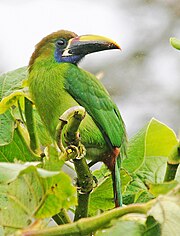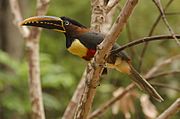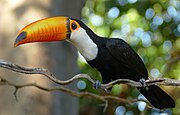List of toucans

Toucans are birds in the family Ramphastidae in the order Piciformes. There are currently 43 extant species of toucans recognised by the International Ornithologists' Union.[1]
Conventions
[edit]| Conservation status | |
|---|---|
| EX | Extinct (0 species) |
| EW | Extinct in the wild (0 species) |
| CR | Critically endangered (0 species) |
| EN | Endangered (1 species) |
| VU | Vulnerable (0 species) |
| NT | Near threatened (5 species) |
| LC | Least concern (28 species) |
Conservation status codes listed follow the International Union for Conservation of Nature (IUCN) Red List of Threatened Species. Range maps are provided wherever possible; if a range map is not available, a description of the toucan’s range is provided. Ranges are based on the IOC World Bird List for that species unless otherwise noted. Population estimates are of the number of mature individuals and are taken from the IUCN Red List.
This list follows the taxonomic treatment (designation and order of species) and nomenclature (scientific and common names) of version 13.2 of the IOC World Bird List.[1] Where the taxonomy proposed by the IOC World Bird List conflicts with the taxonomy followed by the IUCN[a] or the 2023 edition of The Clements Checklist of Birds of the World,[3] the disagreement is noted next to the species's common name (for nomenclatural disagreements) or scientific name (for taxonomic disagreements).
Classification
[edit]The International Ornithologists' Union (IOU) recognises 43 species of toucans in five genera.[1] This list does not include hybrid species, extinct prehistoric species, or putative species not yet accepted by the IOU.
Family Ramphastidae
- Genus Aulacorhynchus: eleven species
- Genus Pteroglossus: fourteen species
- Genus Selenidera: six species
- Genus Andigena: four species
- Genus Ramphastos: eight species
Toucans
[edit]| Common name | Scientific name and subspecies | Range | IUCN status and estimated population |
|---|---|---|---|
| Wagler's toucanet | A. wagleri[b] (Sturm, J. H. C. F., & Sturm, J. W., 1841) |
Southwestern Mexico
|
LC
|
| Emerald toucanet | A. prasinus[b] (Gould, 1833) Four subspecies
|
Eastern Mexico to Nicaragua
|
LC
|
| Blue-throated toucanet | A. caeruleogularis[b] Gould, 1853 Two subspecies
|
Costa Rica to northwestern Colombia
|
LC
|
| White-throated toucanet[c] | A. albivitta[d] (Boissonneau, 1840) Four subspecies
|
Colombia, western Venezuela and eastern Ecuador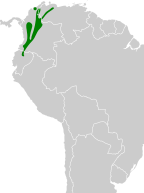
|
LC
|
| Black-throated toucanet | A. atrogularis[d][e] (Sturm, J. H. C. F. & Sturm, J. W., 1841) Four subspecies
|
Central Ecuador to western Bolivia
|
NE
|
| Groove-billed toucanet | A. sulcatus[f] (Sturm, J. H. C. F. & Sturm, J. W., 1841) Three subspecies
|
Northeastern Colombia and northern Venezuela
|
NE
|
| Chestnut-tipped toucanet | A. derbianus Gould, 1835 |
Southeastern Colombia to central Bolivia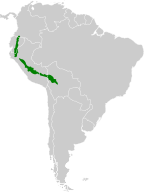
|
LC
|
| Tepui toucanet | A. whitelianus Salvin & Godman, 1882 Three subspecies
|
Southern Venezuela and southern Guyana
|
LC
|
| Crimson-rumped toucanet | A. haematopygus (Gould, 1835) Two subspecies
|
Western Venezuela to eastern Ecuador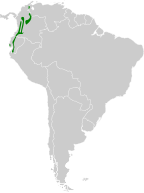
|
LC
|
| Yellow-browed toucanet | A. huallagae Carriker, 1933 |
Northern Peru
|
EN
|
| Blue-banded toucanet | A. coeruleicinctis D'Orbigny, 1840 |
Central Peru to southeastern Bolivia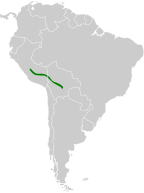
|
LC
|
| Common name | Scientific name and subspecies | Range | IUCN status and estimated population |
|---|---|---|---|
| Green aracari | P. viridis (Linnaeus, 1766) |
Northeastern Amazon rainforest
|
LC
|
| Lettered aracari | P. inscriptus[g] Swainson, 1822 Two subspecies
|
Western and southern Amazon rainforest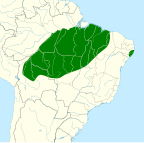
|
NE
|
| Red-necked aracari | P. bitorquatus[h] Vigors, 1826 Three subspecies
|
Southern Amazon rainforest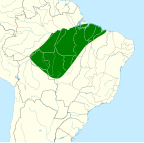
|
NE
|
| Ivory-billed aracari | P. azara[i] Vieillot, 1819 Two subspecies
|
Northwestern Amazon rainforest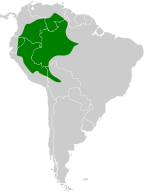
|
NE
|
| Brown-mandibled aracari | P. mariae[i] Gould, 1854 |
Southwestern Amazon rainforest | NE
|
| Black-necked aracari | P. aracari (Linnaeus, 1758) Three subspecies
|
Northeastern and eastern South America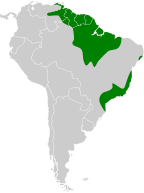
|
LC
|
| Chestnut-eared aracari | P. castanotis Gould, 1834 Two subspecies
|
Western Amazon rainforest to southeastern Brazil
|
LC
|
| Many-banded aracari | P. pluricinctus Gould, 1835 |
Northwestern Amazon rainforest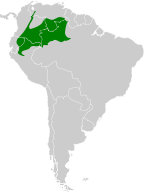
|
LC
|
| Collared aracari | P. torquatus[j] (Gmelin, J. F., 1788) Three subspecies
|
Mexico to Venezuela
|
LC
|
| Stripe-billed aracari | P. sanguineus[j] Gould, 1854 |
Western Colombia and northwestern Ecuador | LC
|
| Pale-mandibled aracari | P. erythropygius[j] Gould, 1843 |
Western Ecuador | LC
|
| Fiery-billed aracari | P. frantzii Cabanis, 1861 |
Costa Rica and Panama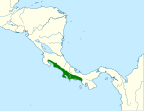
|
LC
|
| Curl-crested aracari | P. beauharnaisii Wagler, 1831 |
Western Amazon rainforest
|
LC
|
| Saffron toucanet | P. bailloni (Vieillot, 1819) |
Southeastern Brazil, eastern Paraguay and northeastern Argentina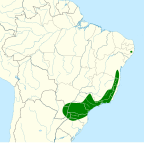
|
NT
|
| Common name | Scientific name and subspecies | Range | IUCN status and estimated population |
|---|---|---|---|
| Yellow-eared toucanet | S. spectabilis Cassin, 1858 |
Honduras to southwestern Colombia
|
LC
|
| Guianan toucanet | S. piperivora (Linnaeus, 1758) |
Northeastern Amazon rainforest
|
LC
|
| Golden-collared toucanet | S. reinwardtii[k] (Wagler, 1827) Two subspecies
|
Western Amazon rainforest
|
NE
|
| Tawny-tufted toucanet | S. nattereri (Gould, 1835) |
Northcentral Amazon rainforest
|
LC
|
| Gould's toucanet | S. gouldii (Natterer, 1837) |
Southern Amazon rainforest
|
LC
|
| Spot-billed toucanet | S. maculirostris (Lichtenstein, M. H. C., 1823) |
Southeastern Brazil, eastern Paraguay and northeastern Argentina
|
LC
|
| Common name | Scientific name and subspecies | Range | IUCN status and estimated population |
|---|---|---|---|
| Grey-breasted mountain toucan | A. hypoglauca (Gould, 1833) Two subspecies
|
Central Colombia to Peru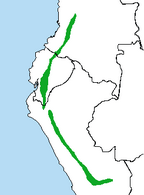
|
NT
|
| Plate-billed mountain toucan | A. laminirostris Gould, 1851 |
Southeastern Colombia to southern Ecuador
|
NT
|
| Hooded mountain toucan | A. cucullata (Gould, 1846) |
Southeastern Peru to central Bolivia
|
LC
|
| Black-billed mountain toucan | A. nigrirostris (Waterhouse, 1839) Three subspecies
|
Western Venezuela to northern Peru
|
LC
|
| Common name | Scientific name and subspecies | Range | IUCN status and estimated population |
|---|---|---|---|
| Red-breasted toucan | R. dicolorus (Linnaeus, 1766) |
Southeastern Brazil, eastern Paraguay and northeastern Argentina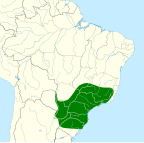
|
LC
|
| Channel-billed toucan | R. vitellinus[l][m] Lichtenstein, M. H. C., 1823 Three subspecies
|
Amazon rainforest and eastern and southeastern Brazil | NE
|
| Citron-throated toucan | R. citreolaemus[l] Gould, 1844 |
Northern Colombia and northwestern Venezuela | LC
|
| Choco toucan | R. brevis Meyer de Schauensee, 1945 |
Northwestern Colombia to southwestern Ecuador
|
LC
|
| Keel-billed toucan | R. sulfuratus Lesson, R. P., 1830 Two subspecies
|
Eastern Mexico to northwestern Venezuela
|
NT
|
| Toco toucan | R. toco Müller, P. L. S., 1776 Two subspecies
|
Northeastern, central, and southeastern South America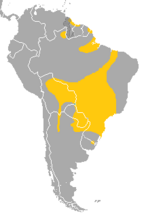
|
LC
|
| White-throated toucan | R. tucanus[n] Linnaeus, 1758 Three subspecies
|
Amazon rainforest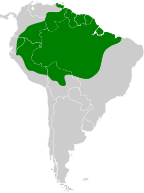
|
NE
|
| Yellow-throated toucan | R. ambiguus Swainson, 1823 Three subspecies
|
Central and northwestern South America
|
NT
|
Notes
[edit]- ^ The IUCN follows the taxonomy proposed by the HBW and BirdLife Taxonomic Checklist.[2]
- ^ a b c The Clements Checklist treats the Wagler's, emerald, and blue-throated toucanets as a one species, the northern emerald-toucanet.[3]
- ^ Called greyish-throated toucanet by the IUCN.
- ^ a b The Clements Checklist treats the white-throated and black-throated toucanets as a one species, the southern emerald-toucanet.[3]
- ^ The IUCN splits the black-throated toucanet sensu lato into two species, the black-billed toucanet (A. cyanolaemus) and black-throated toucanet sensu stricto (A. atrogularis).[2]
- ^ The IUCN splits the groove-billed toucanet sensu lato into two species, the yellow-billed toucanet (A. calorhynchus) and groove-billed toucanet sensu stricto (A. sulcatus).[2]
- ^ The IUCN splits the lettered aracari sensu lato into two species, the Humboldt's aracari (P. humboldti) and lettered aracari sensu stricto (P. inscriptus).[2]
- ^ The IUCN splits the red-necked aracari into two species, the western red-necked aracari (P. sturmii) and eastern red-necked aracari (P. bitorquatus).[2]
- ^ a b The Clements Checklist and IUCN treat the brown-billed aracari as a subspecies of the ivory-billed aracari.[3][2]
- ^ a b c The Clements Checklist treats the stripe-billed and pale-billed aracaris as subspecies of the collared aracari.[3]
- ^ The IUCN splits the golden-collared toucanet into two species, the red-billed toucanet (S. reinwardtii) and green-billed toucanet (S. langsdorffii).[2]
- ^ a b The Clements Checklist treats the citron-throated toucan as a subspecies of the channel-billed toucan.[3]
- ^ The IUCN splits the channel-billed toucan sensu lato into three species, the yellow-ridged toucan (R. culminatus), Ariel toucan (R. ariel), and channel-billed toucan sensu stricto (R. vitellinus).[2]
- ^ The IUCN splits the white-throated toucan into two species, the red-billed toucan (R. tucanus) and Cuvier's toucan (R. cuvieri).[2]
References
[edit]- ^ a b c Gill, F.; Donsker, D.; Rasmussen, P., eds. (July 2023). "Jacamars, puffbirds, barbets, toucans, honeyguides". IOC World Bird List. v 13.2. Retrieved 7 October 2023.
- ^ a b c d e f g h i "Handbook of the Birds of the World and BirdLife International digital checklist of the birds of the world. Version 7". HBW and BirdLife International. 2022. Archived from the original on 25 September 2019. Retrieved 7 October 2023.
- ^ a b c d e f Clements, James F.; Schulenberg, T. S.; Iliff, M. J.; Fredericks, T. A.; Gerbracht, J. A.; Lepage, Denis; Billerman, S. M.; Sullivan, B. L.; Wood, C. L. (2022). "The eBird/Clements checklist of Birds of the World: v2022". Clements Checklist. Retrieved 7 October 2023.
- ^ BirdLife International (2022). "Aulacorhynchus wagleri". IUCN Red List of Threatened Species. 2022: e.T22726177A186729530. Retrieved 21 October 2023.
- ^ BirdLife International (2022). "Aulacorhynchus prasinus". IUCN Red List of Threatened Species. 2022: e.T22726170A168664135. Retrieved 18 November 2023.
- ^ BirdLife International (2022). "Aulacorhynchus caeruleogularis". IUCN Red List of Threatened Species. 2022: e.T22726263A186724272. Retrieved 18 November 2023.
- ^ BirdLife International (2016). "Aulacorhynchus albivitta". IUCN Red List of Threatened Species. 2016: e.T42611196A95138483. doi:10.2305/IUCN.UK.2016-3.RLTS.T42611196A95138483.en. Retrieved 18 November 2023.
- ^ BirdLife International (2016). "Aulacorhynchus derbianus". IUCN Red List of Threatened Species. 2016: e.T22727086A94940722. doi:10.2305/IUCN.UK.2016-3.RLTS.T22727086A94940722.en. Retrieved 18 November 2023.
- ^ BirdLife International (2016). "Aulacorhynchus whitelianus". IUCN Red List of Threatened Species. 2016: e.T22727094A94940906. doi:10.2305/IUCN.UK.2016-3.RLTS.T22727094A94940906.en. Retrieved 18 November 2023.
- ^ BirdLife International (2016). "Aulacorhynchus haematopygus". IUCN Red List of Threatened Species. 2016: e.T22681978A92927477. doi:10.2305/IUCN.UK.2016-3.RLTS.T22681978A92927477.en. Retrieved 18 November 2023.
- ^ BirdLife International (2019). "Aulacorhynchus huallagae". IUCN Red List of Threatened Species. 2019: e.T22681981A155420330. doi:10.2305/IUCN.UK.2019-3.RLTS.T22681981A155420330.en. Retrieved 18 November 2023.
- ^ BirdLife International (2016). "Aulacorhynchus coeruleicinctis". IUCN Red List of Threatened Species. 2016: e.T22681984A92927922. doi:10.2305/IUCN.UK.2016-3.RLTS.T22681984A92927922.en. Retrieved 18 November 2023.
- ^ BirdLife International (2016). "Pteroglossus viridis". IUCN Red List of Threatened Species. 2016: e.T22681994A95210922. doi:10.2305/IUCN.UK.2016-3.RLTS.T22681994A95210922.en. Retrieved 18 November 2023.
- ^ BirdLife International (2016). "Pteroglossus aracari". IUCN Red List of Threatened Species. 2016: e.T22682017A92928534. doi:10.2305/IUCN.UK.2016-3.RLTS.T22682017A92928534.en. Retrieved 18 November 2023.
- ^ BirdLife International (2016). "Pteroglossus castanotis". IUCN Red List of Threatened Species. 2016: e.T22682014A92928299. doi:10.2305/IUCN.UK.2016-3.RLTS.T22682014A92928299.en. Retrieved 22 December 2022.
- ^ BirdLife International (2016). "Pteroglossus pluricinctus". IUCN Red List of Threatened Species. 2016: e.T22682038A92928914. doi:10.2305/IUCN.UK.2016-3.RLTS.T22682038A92928914.en. Retrieved 23 December 2022.
- ^ BirdLife International (2016). "Pteroglossus torquatus". IUCN Red List of Threatened Species. 2016: e.T22726200A94914704. doi:10.2305/IUCN.UK.2016-3.RLTS.T22726200A94914704.en. Retrieved 23 December 2022.
- ^ BirdLife International (2022). "Pteroglossus sanguineus". IUCN Red List of Threatened Species. 2016: e.T22726208A168666334. Retrieved 23 December 2022.
- ^ BirdLife International (2016). "Pteroglossus erythropygius". IUCN Red List of Threatened Species. 2016: e.T22724652A94874977. doi:10.2305/IUCN.UK.2016-3.RLTS.T22724652A94874977.en. Retrieved 23 December 2022.
- ^ BirdLife International (2022). "Pteroglossus frantzii". IUCN Red List of Threatened Species. 2016: e.T22682028A168668139. Retrieved 24 December 2022.
- ^ BirdLife International (2016). "Pteroglossus beauharnaisii". IUCN Red List of Threatened Species. 2016: e.T22682041A92929106. doi:10.2305/IUCN.UK.2016-3.RLTS.T22682041A92929106.en. Retrieved 24 December 2022.
- ^ BirdLife International (2016). "Pteroglossus bailloni". IUCN Red List of Threatened Species. 2016: e.T22682044A92929297. doi:10.2305/IUCN.UK.2016-3.RLTS.T22682044A92929297.en. Retrieved 12 November 2021.
- ^ BirdLife International (2022). "Selenidera spectabilis". IUCN Red List of Threatened Species. 2022: e.T22682071A168669309. Retrieved 18 November 2023.
- ^ BirdLife International (2016). "Selenidera piperivora". IUCN Red List of Threatened Species. 2016: e.T22682084A92930820. doi:10.2305/IUCN.UK.2016-3.RLTS.T22682084A92930820.en. Retrieved 18 November 2023.
- ^ BirdLife International (2016). "Selenidera nattereri". IUCN Red List of Threatened Species. 2016: e.T22682081A92930636. doi:10.2305/IUCN.UK.2016-3.RLTS.T22682081A92930636.en. Retrieved 18 November 2023.
- ^ BirdLife International (2016). "Selenidera gouldii". IUCN Red List of Threatened Species. 2016: e.T22682096A92931217. doi:10.2305/IUCN.UK.2016-3.RLTS.T22682096A92931217.en. Retrieved 18 November 2023.
- ^ BirdLife International (2016). "Selenidera maculirostris". IUCN Red List of Threatened Species. 2016: e.T22682093A92931021. doi:10.2305/IUCN.UK.2016-3.RLTS.T22682093A92931021.en. Retrieved 18 November 2023.
- ^ BirdLife International (2016). "Andigena hypoglauca". IUCN Red List of Threatened Species. 2016: e.T22682055A92929841. doi:10.2305/IUCN.UK.2016-3.RLTS.T22682055A92929841.en. Retrieved 18 November 2023.
- ^ BirdLife International (2016). "Andigena laminirostris". IUCN Red List of Threatened Species. 2016: e.T22682050A92929574. doi:10.2305/IUCN.UK.2016-3.RLTS.T22682050A92929574.en. Retrieved 18 November 2023.
- ^ BirdLife International (2016). "Andigena cucullata". IUCN Red List of Threatened Species. 2016: e.T22682061A92930101. doi:10.2305/IUCN.UK.2016-3.RLTS.T22682061A92930101.en. Retrieved 18 November 2023.
- ^ BirdLife International (2018). "Andigena nigrirostris". IUCN Red List of Threatened Species. 2018: e.T22682066A130076475. doi:10.2305/IUCN.UK.2018-2.RLTS.T22682066A130076475.en. Retrieved 18 November 2023.
- ^ BirdLife International (2018). "Ramphastos dicolorus". IUCN Red List of Threatened Species. 2018: e.T22682129A131278894. doi:10.2305/IUCN.UK.2018-2.RLTS.T22682129A131278894.en. Retrieved 18 November 2023.
- ^ BirdLife International (2016). "Ramphastos citreolaemus". IUCN Red List of Threatened Species. 2016: e.T62220237A95192753. doi:10.2305/IUCN.UK.2016-3.RLTS.T62220237A95192753.en. Retrieved 18 November 2023.
- ^ BirdLife International (2016). "Ramphastos brevis". IUCN Red List of Threatened Species. 2016: e.T22682105A92931639. doi:10.2305/IUCN.UK.2016-3.RLTS.T22682105A92931639.en. Retrieved 18 November 2023.
- ^ BirdLife International (2021). "Ramphastos sulfuratus". IUCN Red List of Threatened Species. 2021: e.T22682102A168670038. doi:10.2305/IUCN.UK.2021-3.RLTS.T22682102A168670038.en. Retrieved 18 November 2023.
- ^ BirdLife International (2017). "Ramphastos toco". IUCN Red List of Threatened Species. 2017: e.T22682164A113557535. doi:10.2305/IUCN.UK.2017-1.RLTS.T22682164A113557535.en. Retrieved 18 November 2023.
- ^ BirdLife International (2016). "Ramphastos ambiguus". IUCN Red List of Threatened Species. 2016: e.T22727999A94967701. doi:10.2305/IUCN.UK.2016-3.RLTS.T22727999A94967701.en. Retrieved 18 November 2023.



